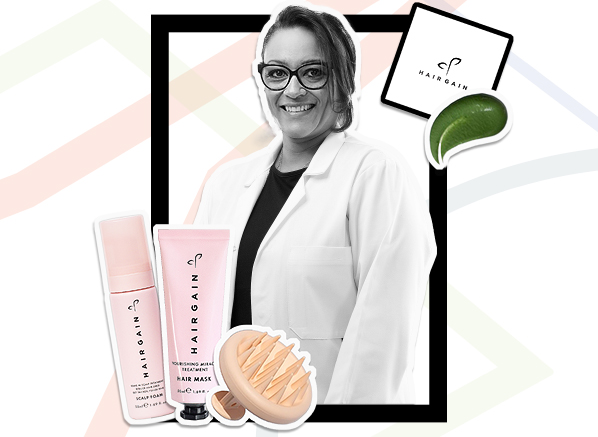
Delving into the intricacies of scalp health, we sought guidance from Samantha Stewart, MIT, a Trichologist and scalp expert with three decades of experience at The Spencer Clinic of Trichology. With distinguished qualifications from the Institute of Trichologists, including the prestigious John Firmage Award, Samantha is a revered figure in the field.
As a tutor and board member at the Institute, she fosters excellence in trichology education while championing advancements in hair care. Named ambassador and resident trichologist for Hair Gain in 2023, her journey exemplifies dedication to transformative hair solutions. Learn with us as we uncover her insights into common scalp health queries…
Skip To:
FAQS
1. What is my scalp type (oily, dry, sensitive)?
Understanding our scalp type before choosing hair and scalp products is important. This helps ensure that we maintain optimum scalp and hair health. When assessing whether we have an oily, flaky, sensitive or normal scalp, we must consider how long our scalp takes to get oily, begin to flake or show signs of sensitivity such as itching.
An oily scalp tends to get oily on the same day it has been washed or within one or two days.
A sensitive scalp will become easily irritated or flake. It can itch, burn, or show signs of inflammation, which could happen as soon as a couple of hours after washing. You don’t experience discomfort or irritation if you have a normal scalp.
2. How often should I wash my hair, and is it bad to wash it daily?
This all depends on the individual’s hair and scalp needs and the products used. When deciding on shampooing frequency, you need to consider the hair type, the condition of the hair and the needs of the scalp. There is no hard or fast rule regarding how often hair should be washed. Still, it is important to remember that washing with the correct products regularly hydrates and moisturises the hair and helps keep the scalp environment in optimum health.
3. What are the signs of an unhealthy scalp, and what could be causing them (dandruff, itchiness, flakiness)?
The signs of an unhealthy scalp are any signs of irritation, visible scales, flaking, pain or signs of inflammation. It is important also to assess what these signs mean and when they occur, as the timing can mean different things.
If the scalp is sensitive, irrespective of whether it is clean or not, it could indicate a more chronic issue, whereby if the hair and scalp haven’t been washed for some time, mild scalp irritation, mild flaking or slight itching could occur because your scalp is long overdue a wash.
4. Is there a link between diet and scalp health?
A growing body of evidence suggests a link between diet and scalp health. Some individuals’ scalps will be directly affected by certain foods and will cause an adverse reaction, such as inflammation and scaling.
For those with a sensitive scalp, anything that can cause systemic inflammation can affect the scalp, triggering or exacerbating a chronic scalp condition or certain hair loss conditions.
5. How can I protect my scalp from environmental damage (sun, pollution)?
Protecting your scalp from environmental damage involves a combination of preventive measures and appropriate hair care products. This can include specifically designed sunscreens for the hair and scalp. The sun’s rays can act the same way as a bleaching agent on the hair shaft and cause as much damage if you expose your hair too much. The sun can weaken your hair’s protein structure, leach moisture from the hair and lead to breakage.
You can help protect your hair by using products that contain an SPF and wearing a hat when sitting in direct sunlight. Always ensure that you follow sunbathing rules. Hair masks, such as the nourishing miracle mask, are a great way to moisturise your hair during summer. It’s equally as important to protect your scalp from the sun. Our hair offers some protection from the sun, but it is not always enough. Always ensure that you protect partings and thinner areas from the sun. This can be done with specialist SPF scalp products and wearing a hat when sitting in direct sunlight.
Incorporating a scalp massager when shampooing can help exfoliate the scalp and remove any build-up of dead skin cells and pollutants that can irritate it. Antioxidant hair care, detoxing shampoos and hair masks can help repair, strengthen and balance the scalp’s ecosystem from the damage caused by pollution.
Ask The Expert
Coming Up Next
22nd April – Samantha tells us how to solve hair concerns related to scalp issues.
20th May – Samantha discusses emerging scalp trends and interests.






